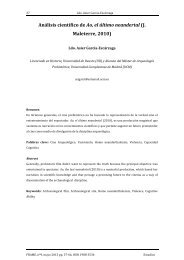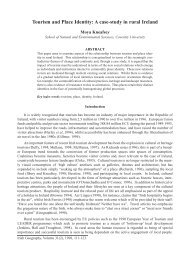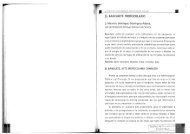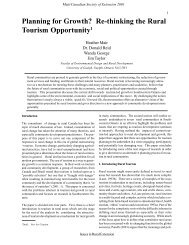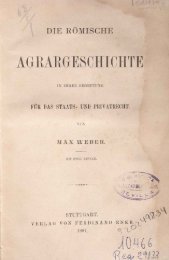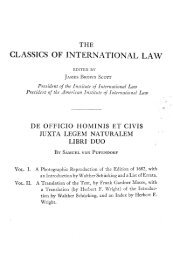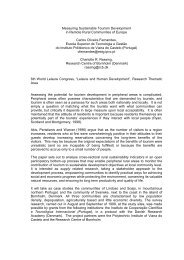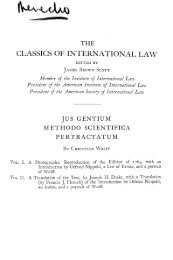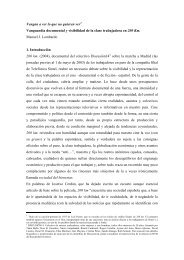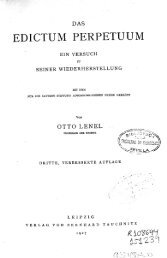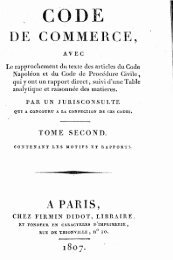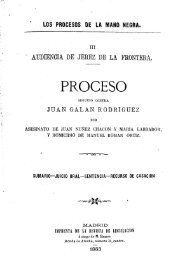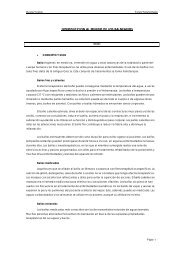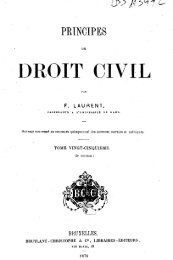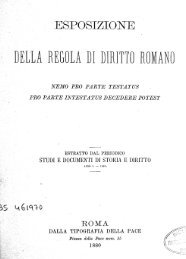Progreso y vicisitudes del idioma castellano en nuestros cuerpos ...
Progreso y vicisitudes del idioma castellano en nuestros cuerpos ...
Progreso y vicisitudes del idioma castellano en nuestros cuerpos ...
Create successful ePaper yourself
Turn your PDF publications into a flip-book with our unique Google optimized e-Paper software.
76<br />
Los adjetivos primero, segundo y ci<strong>en</strong>to se usaban indifer<strong>en</strong>tem<strong>en</strong>te<br />
primer ó primero, segund ó segundo, ci<strong>en</strong>t<br />
ci<strong>en</strong>to ( 1), y lo mismo sucedía <strong>en</strong> algun y ningun, que ya se<br />
escribian con o final, ya sin ella ( u). Cuando varios substantivos<br />
se referian á un solo verbo, la concordancia era muchas<br />
veces con el singular, no con el plural segun ahora .es regla<br />
inconcusa (3).<br />
En los pronombres todavía exist<strong>en</strong> más difer<strong>en</strong>cias. El, se<br />
usaba de varios modos, ya como <strong>en</strong> la actualidad el (1), ya<br />
suprimi<strong>en</strong>do la e y agregando la / á la terminacion <strong>del</strong> verbo<br />
(1) E depues viniere el primero marido, limos sean metidos <strong>en</strong> podQr <strong>del</strong><br />
primer marido. Ley 6, tít. 2, lib. Fuer. Juzg.<br />
Del primer dia de febrero fasta el primero d'abril-Ley 13, tít. 3, lib. 12. Id.<br />
Se quisiere casar primero casami<strong>en</strong>to. Ley 8, tít. 3, lib. 12. Id.<br />
Desde el primer anno que nos regnamos , <strong>del</strong> primer dia. Ley 12 , tít. 3,<br />
lib. 12. Id.<br />
Deste segund anno. Ley 1, tít. 1, lib. 2. Id.<br />
Fastal segund anno. Ley 6, tít. 1, lib. 2. Id.<br />
Del segundo grado. Ley 2, tít. 1, lib. 4. Id.<br />
Que es <strong>en</strong> el segundo titol. Ley 3, tít. 2, lib. 6. Id.<br />
Reciba ci<strong>en</strong>to azotes. Ley 22, tít. 1, lib. 2. Id.<br />
Fagal dar el s<strong>en</strong>nor ci<strong>en</strong>to azotes. Ley 17, tít. 4, lib. 3. Id.<br />
Y el que ha de guardar ci<strong>en</strong>t omnes. Ley 1, tít. 2, lib. 9. Id.<br />
Si el que ha de mandar ci<strong>en</strong>t omnes. Ley 3. Id. id. id.<br />
(2) Si algun siervo fuere acusado..... é si algun omne fiziere torm<strong>en</strong>tar. Ley 5<br />
tít. 1, lib. 6. Id.<br />
Si alguno empresta á aluga. Ley 2, tít. 5, lib. 5. Id.<br />
O alguno de su linaje se osare casar cuin algum. Ley 17 , tít. 7. Id. id,<br />
Si alguno toma ayer emprestado. Ley a, tít. 5. Id: id.<br />
Si alguno omne v<strong>en</strong>de algunas casas. Ley 7, tít. 4. Id. id.<br />
Ningun omne de ninguna religion, nin de ningun órd<strong>en</strong> nin ningund omne<br />
de ningun linage Ninguno no los ose def<strong>en</strong>der Ninguno non se trabaie<br />
por les•dar ayuda. Ley 15, tít. 2, lib. 12. Id.<br />
(3) Si el maestro, ó el padron, ó el s<strong>en</strong>nor no lo [izo por ninguna malquer<strong>en</strong>cia<br />
non deve seer p<strong>en</strong>ado ni des fa<strong>en</strong>ado. Ley 8, tít. 5, lib. 6. Id.<br />
Et si el iudez fuere provado ó el obispo que iutgó tuerto. Ley 22, tít.. 1,<br />
lib. 2. Id.<br />
(4) En lo que él dixo. Ley 3, tít. L Id. id.



